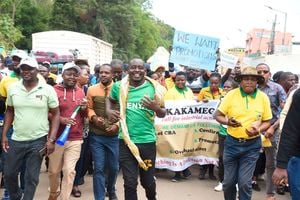
Teachers Service Commission CEO Nancy Macharia (center) with Kenya Union of Post-Primary Education Teachers Secretary-General Akelo Misori (left), TSC Chairman Dr. Jamleck Muturi (right) and other officials during a press briefing in Nairobi on September 2, 2024.
Negotiations, denial of cash, intimidation, and threats to cripple union are some of the tactics the government and the Teachers Service Commission (TSC) employed to force the Kenya Union of Post Primary Education Teachers (Kuppet) to call off their strike on Monday evening, the Nation can reveal.
Some members of the national executive board (NEB) of the union have also been accused of having been double-agents for the government as they are said to have conflicting interests.
The NEB held a daylong meeting with the TSC on Monday from which they emerged to announce the cancellation of the strike. It came as a surprise to teachers who had spent the day demonstrating in the streets and had planned for a continuation of the strike that gained momentum and some schools closed for fear of students’ unrest.
Kuppet had planned the strike jointly with the sister Kenya National Union of Teachers (Knut) which bolted out on the eve of the industrial action that began on August 26, 2024.
Last week, Knut secretary-general told Nation that top officials of the unions had agreed on Saturday August 24 2024 to call off the strike only for the national governing council (NGC) of Kuppet to sanction the strike the following day.
On Sunday September 1 2024, the NGC reiterated its commitment to continuing the strike until all their demands were met and retreated to the branches to mobilise for more demonstrations.
However, the resolve of the NEB persisted until Monday, September 2, 2024, when they unexpectedly announced that the strike had been called off.
It has now emerged that familiar behind-the-scenes dark arts previously employed by TSC brought the union to the negotiating table.
“Obviously, Kuppet did not win all we set out for in this strike. However, the agreement constitutes a major win for the union,” the secretary-general, Akello Misori would later admit.
Last week, the commission stated that it would only engage in any discussion with the union after it called off the strike. As the Kuppet officials walked into the TSC boardroom for negotiations, the commission had already denied them the members’ union dues for August as it declined to deduct and remit, although this is an obligation under their recognition agreement.
Kuppet officials are all too familiar with this tactic that brought Knut to its knees after their fallout with the employer in 2019.
Withholding of union dues is a forceful tool that significantly impacts a union's ability to operate effectively. Without the funds, Kuppet would struggle to support its national and branch offices as well as sustain the strike.
The TSC’s decision to use this approach seemed to have cornered KUPPET, leaving them with little choice but to reconsider their tough position.
Every Kuppet member is deducted 1.8 per cent of their basic salary every month which is then remitted to the union. Non-members are deducted at the same rate as agency fees, for being beneficiaries of deals struck by Kuppet with the TSC on teachers’ remuneration.
“If the dues are being withheld, union members would need to find alternative ways to support the organisation if they want a strong union," Mr Misori had stated before giving in.
Kuppet, with a membership of about 135,000 generates more than Sh35 million each month to cover its operational costs, such as branch activities, staff salaries, and legal expenses. Together, Kuppet and Knut receive nearly Sh2 billion annually from teachers nationwide.Knut members pay 2 per cent of their basic salary.
Kuppet also faced the threat of exclusion from the Ministry of Labour's list of unions authorised to collect dues as was done to Knut in 2021. The fear of losing this critical funding stream that would cripple the union played a role in the decision of Kuppet officials.
Additionally, the government is believed to have played a role in this strategy by engaging Kuppet leaders in the behind-the-scenes negotiations, promising future concessions and making assurances that their concerns would be addressed in subsequent discussions.
The combination of financial pressure from the TSC and the government's diplomatic overtures appeared to have been enough to convince them to call off the strike, despite their earlier resolve.
“The TSC reached out to us informally seeking assurance of our seriousness, which is why we formally wrote a letter and sought a meeting. However, it became clear that their intent was to blackmail us. I want to warn the TSC that teachers are not to be dismissed lightly. Those court orders are being misinterpreted,” said Mr Misori during a press conference.
Furthermore, the activation of the "exit button," on the T-Pay system through which teachers access their pay slips intimidated the officials to soften their hard stance.
The function was first used on Knut where teachers who quit the union benefited from a negotiated pay increase while members of Knut were left out. Knut accused TSC of withdrawing their membership illegally.
Its numbers plummeted from a peak of 187,471 to just 15,000. This threat loomed large, particularly given the significant membership shifts in recent years. The possibility of losing members — and, by extension, the financial stability of the union — was a serious concern for Kuppet.
As the planned strike approached, Kuppet publicly urged its members to participate, accusing the TSC of attempting to silence their voices. Behind the scenes, however, a different narrative was unfolding.
According to a source at the union, there have been ongoing threats to weaken the union. During the strike, some officials were arrested in various counties, and the TSC dispatched officers to monitor teachers who failed to report to work for possible disciplinary action.
“There have been persistent threats to dismantle the union. Over the weekend, two of our officials were arrested, and the TSC sent officers to check on teachers who had reported to work something that tells you our teachers were at risk,” he said
Kuppet secretary for secondary schools, Edward Obwocha disagreed with the other NEB and walked out of the meeting while expressing his frustration to call off the strike without a concrete return-to-work formula.
“Yesterday [Sunday] the National Governing Committee (NGC) met and said that if there's a return-to-work formula, the document can be sent online and they approve. They were in a hurry to sign without anything tangible but just promises and that's why I stormed out,' highlighting concerns among union members about the lack of concrete agreements and perceived haste in finalising the return-to-work formula,” he said.
“In compliance with the court order and to facilitate ongoing discussions, we have decided to suspend the strike and urge all our teachers to return to class. We are committed to ensuring that the outstanding issues are resolved swiftly in collaboration with the commission,” said Mr Misori.
However, KNUT secretary General Collins Oyuu said that on the eve of the strike, unions met with government representatives and discussed the possibility of calling it off. Despite these discussions, KUPPET's National Governing Council insisted on proceeding with the strike, a stance that caught the brother union by surprise.
On Tuesday, Kuppet chairperson Omboko Milemba stated that the union officials and those of Knut had convened multiple times and agreed to proceed with the strike, voicing concerns about the procedures for organising strikes and pointing out significant issues with documentation and communication.
"We met several times, and we never agreed to halt the strike. We agreed that it would continue, only for them [Knut] to betray us. It was clear that the notice had already been submitted," he said.









